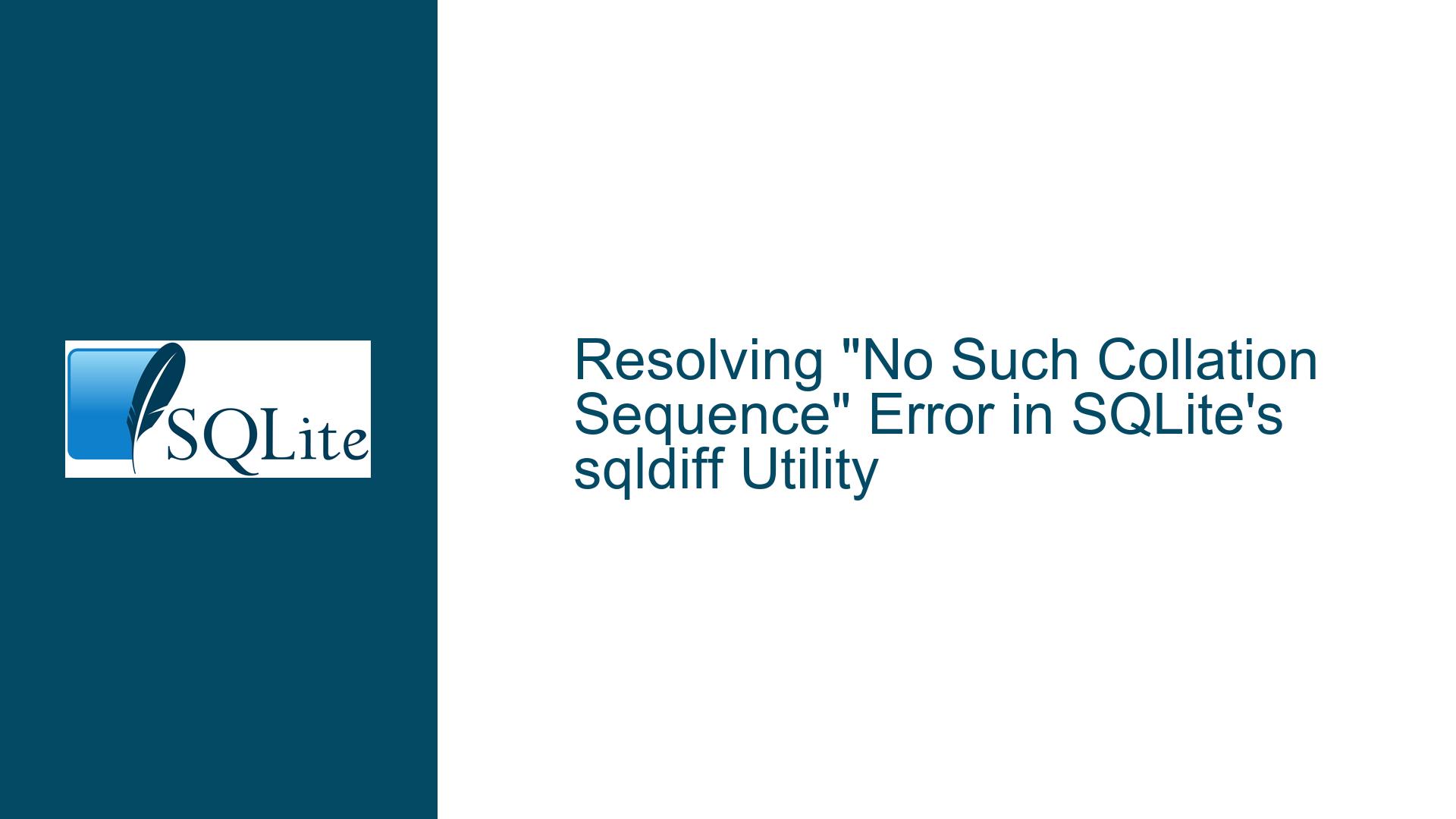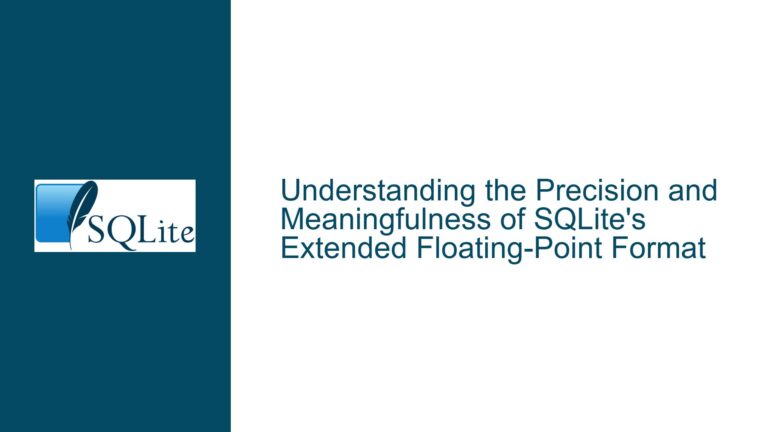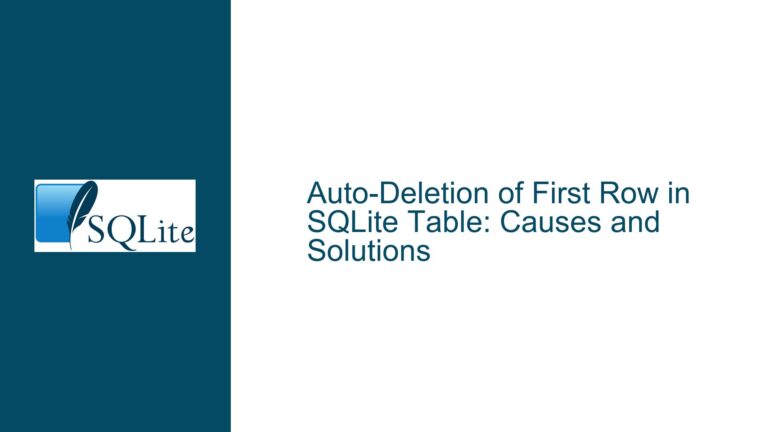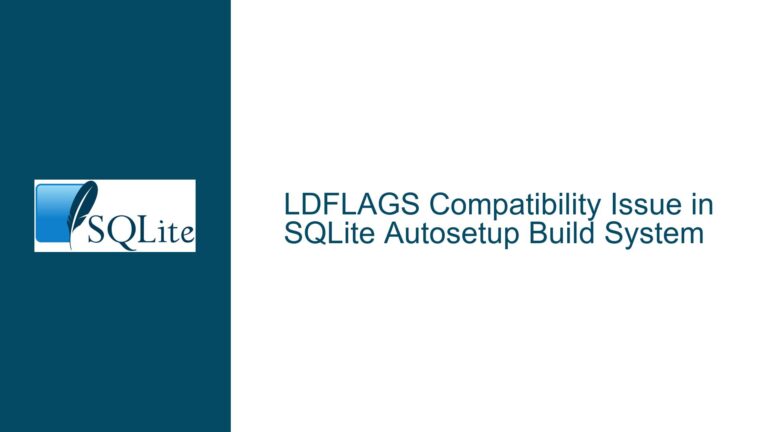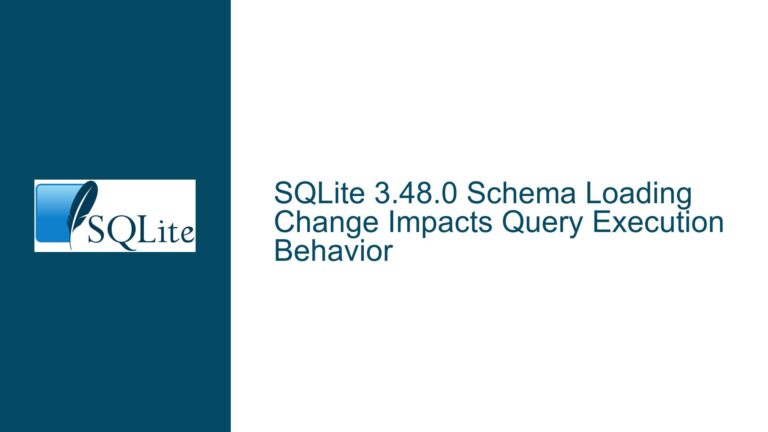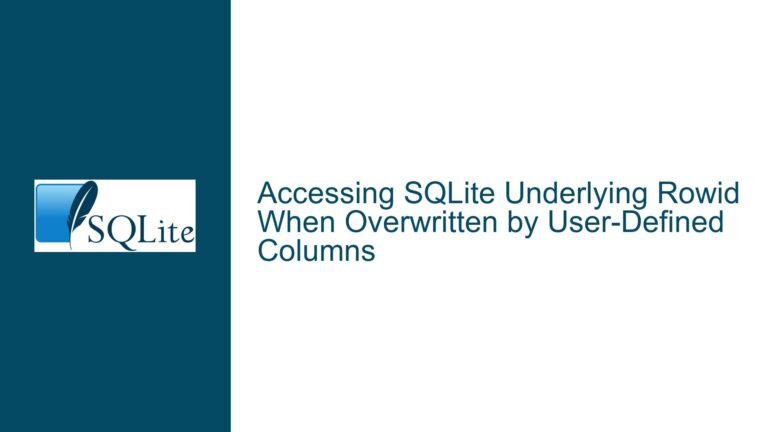Resolving “No Such Collation Sequence” Error in SQLite’s sqldiff Utility
Understanding the "No Such Collation Sequence" Error in sqldiff
The "no such collation sequence" error in SQLite’s sqldiff utility typically arises when the utility attempts to compare two databases that rely on a custom collation sequence, but the collation sequence is not available in the environment where sqldiff is being executed. Collation sequences in SQLite are used to define how strings are compared and sorted, and custom collations are often implemented via SQLite extensions. When sqldiff encounters a collation sequence that it cannot recognize, it throws this error, halting the comparison process.
In the context of the discussion, the error specifically mentions the "unicase" collation sequence, which is not a built-in collation in SQLite. This collation sequence is likely provided by an external SQLite extension that was loaded into the original database environment but is not available when running sqldiff. The absence of this collation sequence prevents sqldiff from accurately comparing the databases, as it cannot interpret the custom collation rules.
Possible Causes of the Missing Collation Sequence
The root cause of the "no such collation sequence" error lies in the dependency of the database on an external SQLite extension that provides the custom collation. Several factors can contribute to this issue:
Unloaded Extension in sqldiff Environment: The most common cause is that the SQLite extension providing the "unicase" collation sequence is not loaded when
sqldiffis executed. Unlike the original database environment, where the extension might have been loaded using theSQLITE_LOAD_EXTENSIONmechanism or similar,sqldiffdoes not automatically load extensions unless explicitly instructed to do so.Incorrect or Missing Extension Entry Point: SQLite extensions must define an entry point function that adheres to a specific naming convention. If the extension providing the "unicase" collation sequence does not follow this convention,
sqldiffwill be unable to load it, even if the extension file is present. This can occur if the extension was poorly designed or if it was modified in a way that broke compatibility.Extension File Not Accessible: The extension file itself might be missing or inaccessible in the environment where
sqldiffis being run. This could happen if the file was not copied to the correct directory or if there are permission issues preventingsqldifffrom accessing it.Version Mismatch Between SQLite and Extension: If the SQLite version used by
sqldiffis different from the version used when the extension was built, there might be compatibility issues. Extensions are often compiled against specific versions of SQLite, and using them with a different version can lead to undefined behavior, including the inability to load collation sequences.Custom Collation Not Registered: In some cases, the custom collation might not have been properly registered with SQLite. Collations are typically registered using the
sqlite3_create_collationfunction. If this registration step was skipped or failed, the collation sequence will not be available, even if the extension is loaded.
Troubleshooting Steps, Solutions, and Fixes
To resolve the "no such collation sequence" error in sqldiff, follow these detailed troubleshooting steps:
1. Load the Required Extension in sqldiff
The simplest and most effective solution is to ensure that the SQLite extension providing the "unicase" collation sequence is loaded when running sqldiff. This can be achieved using the --load-extension option provided by sqldiff. Here’s how to do it:
Locate the Extension File: First, identify the file path of the SQLite extension that provides the "unicase" collation sequence. This file typically has a
.so(shared object) extension on Unix-like systems or a.dllextension on Windows.Use the
--load-extensionOption: Runsqldiffwith the--load-extensionoption, specifying the path to the extension file. For example:sqldiff --load-extension /path/to/extension.so main.db aux.dbReplace
/path/to/extension.sowith the actual path to your extension file.Verify Extension Loading: After running the command, check if the error persists. If the extension is loaded successfully,
sqldiffshould be able to recognize the "unicase" collation sequence and proceed with the comparison.
2. Ensure Correct Extension Entry Point Naming
If loading the extension does not resolve the issue, the problem might lie in the naming of the extension’s entry point function. SQLite expects extensions to define an entry point function named sqlite3_extension_init. If the extension uses a different name, sqldiff will not be able to load it.
Inspect the Extension Source Code: If you have access to the extension’s source code, verify that the entry point function is named
sqlite3_extension_init. For example:int sqlite3_extension_init(sqlite3 *db, char **pzErrMsg, const sqlite3_api_routines *pApi) { // Extension initialization code }Rebuild the Extension: If the entry point function is incorrectly named, modify the source code to use the correct name and rebuild the extension. Ensure that the build process links against the correct version of SQLite.
Test the Rebuilt Extension: After rebuilding, load the extension again using the
--load-extensionoption and verify thatsqldiffcan now recognize the "unicase" collation sequence.
3. Check Extension File Accessibility and Permissions
If the extension file is missing or inaccessible, sqldiff will not be able to load it, resulting in the "no such collation sequence" error.
Verify File Presence: Ensure that the extension file exists in the specified path. Use the
lscommand on Unix-like systems ordiron Windows to check for the file.Check File Permissions: Ensure that the file has the appropriate permissions to be read by the user running
sqldiff. On Unix-like systems, you can use thechmodcommand to adjust permissions:chmod 755 /path/to/extension.soCopy the Extension to a Standard Location: If the extension file is located in a non-standard directory, consider copying it to a directory that is included in the system’s library path. For example, on Unix-like systems, you can copy the file to
/usr/libor/usr/local/lib.
4. Address Version Mismatch Between SQLite and Extension
A version mismatch between the SQLite version used by sqldiff and the version against which the extension was compiled can cause compatibility issues.
Check SQLite Version: Determine the version of SQLite used by
sqldiffby running:sqldiff --versionVerify Extension Compatibility: Ensure that the extension was compiled against a compatible version of SQLite. If necessary, recompile the extension using the same version of SQLite as
sqldiff.Update SQLite or Extension: If a version mismatch is detected, consider updating either SQLite or the extension to ensure compatibility. This might involve downloading a newer version of SQLite or obtaining an updated version of the extension.
5. Manually Register the Custom Collation
If the custom collation sequence is not being registered correctly, you can manually register it using the sqlite3_create_collation function. This approach requires modifying the code that initializes the database connection.
Modify Database Initialization Code: Locate the code that initializes the database connection and add a call to
sqlite3_create_collationto register the "unicase" collation sequence. For example:sqlite3_create_collation(db, "unicase", SQLITE_UTF8, NULL, unicase_collation_func);Here,
unicase_collation_funcis a function that implements the custom collation logic.Rebuild and Test: Rebuild the application or script that initializes the database connection and test whether
sqldiffcan now recognize the "unicase" collation sequence.
6. Use NOCASE as a Fallback Collation
If loading the extension or registering the custom collation is not feasible, consider using the built-in NOCASE collation as a fallback. This approach involves creating clones of the tables that use the "unicase" collation, replacing it with NOCASE, and then running sqldiff on the cloned tables.
Create Cloned Tables: Use SQL statements to create clones of the original tables, replacing the "unicase" collation with
NOCASE. For example:CREATE TABLE cloned_table AS SELECT * FROM original_table ORDER BY column_name COLLATE NOCASE;Run sqldiff on Cloned Tables: Execute
sqldiffon the cloned tables instead of the original tables. This should allowsqldiffto perform the comparison without encountering the "no such collation sequence" error.Restore Original Tables: After completing the comparison, you can delete the cloned tables or use the results to update the original tables as needed.
By following these troubleshooting steps, you should be able to resolve the "no such collation sequence" error in sqldiff and successfully compare databases that rely on custom collation sequences. Each step addresses a potential cause of the issue, ensuring a comprehensive approach to troubleshooting and fixing the problem.
